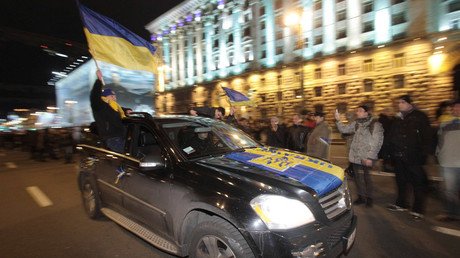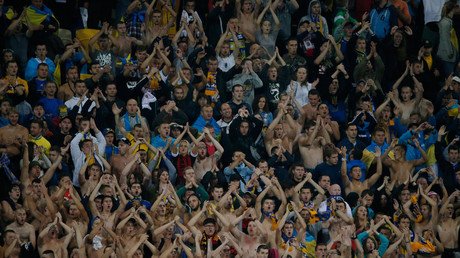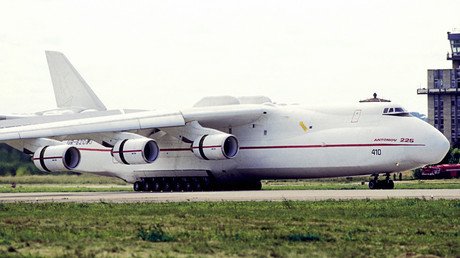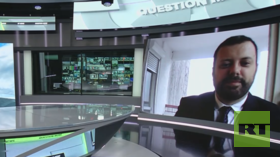Ukraine marks ‘Dignity & Freedom Day’ as Euromaidan dream falters
Three years ago people in Kiev took to the streets in an anti-government protest which resulted in riots, over a hundred deaths, and an ousted government. Three years on, Ukraine is an impoverished country rife with corruption and far from its European dreams.
The events in Kiev were labeled the ‘Revolution of Dignity’ by the victors, who seized power on the back of right-wing radicals and promises of integrating Ukraine into the EU. This year November 21 was made a national holiday, although its name, ‘Dignity and Freedom Day’, appears to be far from the actual impact the coup had on the country.
Corruption persists
One of the greatest motives for Ukrainians to rise up against the government was perceived corruption. Then-President Viktor Yanukovich was seen as a greedy embezzler who used his position to amass huge levels of wealth for his family and allies – often by seizing the assets of his political and business rivals.
READ MORE: Biden warns Ukraine needs reforms or EU may drop Russia sanctions
The new authorities promised to relentlessly fight endemic corruption, and while some reforms did take place, even close Kiev allies such as US Vice President Joe Biden have said not enough is being done. Transparency International’s latest report on corruption in Europe ranks Ukraine as one of the worst nations on all fronts. According to 86 percent of Ukrainians, their government is performing ‘badly’ or ‘very badly’ in fighting corruption – the worst rating among all countries polled.
The image of Ukrainian officials was dealt another crushing blow late last month, after they were forced by the EU to declare their property in a public database. In a country where the average monthly income languishes at around $200, lawmakers, judges, prosecutors and other figures of power disclosed ownership of numerous apartments and luxury cars, antiquities and holy relics, designer watches and vintage wines.
The public was outraged to find that even people of more modest backgrounds, who came to power as so-called Euromaidan activists or frontline volunteers, have managed to become rich while their fellow citizens struggled with increasing tariffs and taxes – imposed to secure loans from the International Monetary Fund (IMF).
Some analysts were quick to point out sarcastically that Ukrainian officials, including the head of the national bank, preferred to keep their wealth in bags full of dollars and euros in safes at their homes rather than entrust it to the Ukrainian financial system.
President Petro Poroshenko has climbed up the ratings of Ukraine’s wealthiest people during his tenure. The October list published by Novoye Vremya business magazine puts him in the fourth place – although that’s largely because the assets of other rich Ukrainians have tanked along with the country’s economy.
Knocking on the EU’s door
The uprising in Kiev was supposedly triggered by Yanukovich’s decision to postpone a free trade deal with the EU. In the eyes of many protesters, the deal would pave the way for a European standard of living and the prospect of visa-free travel within the EU. Ukraine has been negotiating the end of visas with the Schengen zone since 2008.
Poroshenko has dangled the visa-free carrot in front of Ukrainians on numerous occasions, but reaching it remains painfully slow. The latest deadline set by the president is November 24. The EU has confirmed that Ukraine met its obligations to be granted tourist access, but said it would have to wait until the bloc agrees a mechanism for the emergency termination of the visa-free regime – a measure necessary to curb unwanted immigrants.
But even once Ukrainians are allowed to enter EU countries without visas, they would only be welcomed as tourists – something at odds with the reality for the majority of people, for whom the question at hand is how to make ends meet, not which European capital to choose for a weekend trip. What the EU does not want to see is an influx of Ukrainian guest workers seeking jobs despite not having work permits. At the moment, roughly one Ukrainian in six makes his or her living working in Russia or European nations like Poland and Bulgaria.
Trade deal disappointment
The coveted EU association deal is still on the back burner for Ukraine after the Netherlands stalled its ratification. The Dutch held a referendum in April on whether to implement the step, with the majority voting against it. The Dutch government is now seeking a compromise with other union members in the form of a binding document, which would state that by ratifying the trade deal the EU does not imply that Ukraine may eventually become a full-fledged member.
READ MORE: 61% of Dutch voters say no to ratifying EU-Ukraine deal – preliminary results
The delay may be a thorn in the side of Kiev politicians, who claimed to have universal support for Ukraine’s European aspirations and were struggling to explain the Dutch demur. But it’s more a technical issue, since the free trade part of the deal – intended to revitalize the Ukrainian economy by opening European markets to Ukrainian goods and offering high quality European products to Ukrainian consumers at lower prices – has been in full force for over a year.
This, however, hasn’t panned out as it was supposed to. Ukrainian businessmen have found that they either cannot compete with the Europeans or are prevented from doing so by EU protectionist measures. The EU’s annual quotas on the import of agriculture goods – an area where Ukraine, with its vast fertile fields, has a chance to be competitive – are so small that the Ukrainians meet them in the matter of a couple of months. And in other industries Ukrainian producers cannot meet European standards without significant modernization investment – which they cannot afford.
According to the Ukrainian national statistics service, in the first three quarters of 2016 Ukrainian exports to the EU were $9.7 billion, compared to $13.4 billion in 2014. The country’s exports to Russia over the same period fell by 30 percent to $2.5 billion compared to the previous year. Despite Kiev’s efforts to sever economic ties with Russia, it remains the largest single-country importer of Ukrainian products, followed by China and Egypt.
Ukraine’s failure to gain a larger share of European markets is coupled with the devaluation of the national currency, which fell fourfold against the US dollar in the last three years.
Patriotic fervor
While Ukrainian officials fail to deliver on the promise of a better life, they seem to be trying to compensate by whipping up patriotic fervor and quashing dissent. The cause of all the woes of the Ukrainian people, as depicted by the authorities and the media under their control, is a malevolent Russia and its president, Vladimir Putin.
The latest incarnation of this tactic is called ‘Shatun’ – the Russian noun for the verb ‘to rock’ – and is an alleged plan to destabilize the situation in Ukraine authored by Vladislav Surkov, an aide to President Putin. Details of the alleged master plan were revealed by “patriotic hackers,” as the group was described by top Ukrainian officials, who insisted that the leaked documents were authentic.
Many other commenters, including in Ukraine, believe them to be crude fakes meant to discredit anyone criticizing government policies or excesses. As one MP put it, “Operation Shatun is a government cover-up for operation Kradun [thief].”
















